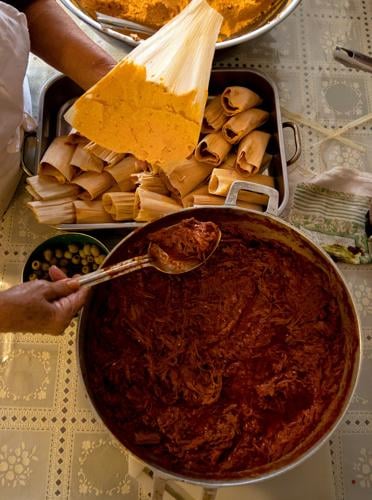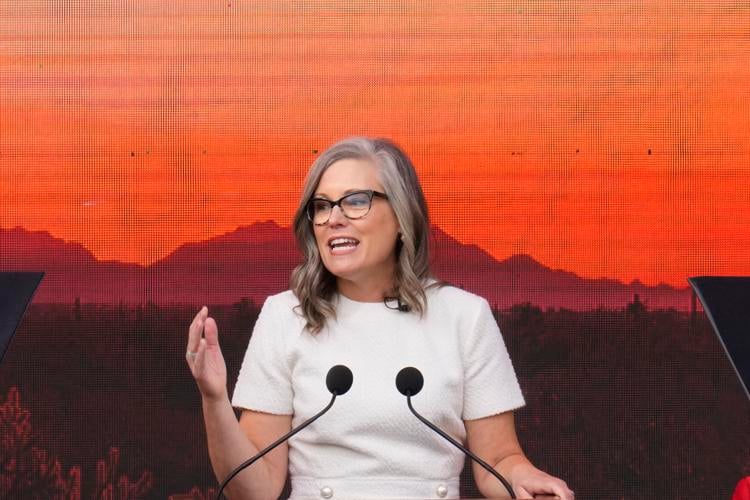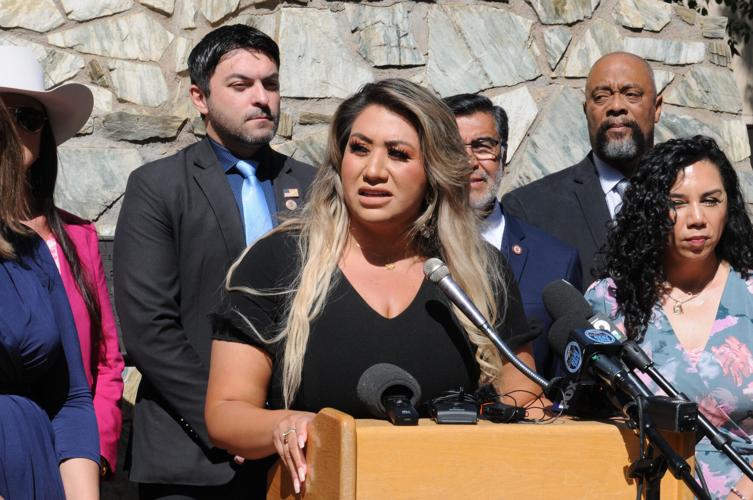Gov. Katie Hobbs is promising to sign legislation to legalize the practice of selling home-cooked foods on the street when the Legislature reconvenes.
But the Democratic governor, who vetoed a measure to do just that earlier this year, still can’t — or won’t — say what she wants in a new version to gain her signature when lawmakers reconvene in January.
About the only thing she will commit to is that she won’t demand that health inspectors be allowed to drop, unannounced, into home kitchens.
Whether she wants other inspections remains an unanswered question.
The issue transcends the tamales that became the hot-button issue and focus of extensive debate earlier this year.
It also comes down to what Hobbs believes is the role of government in regulation, and to the question of whether Arizonans, given certain information, should have the right to assume certain risks without having the state tell them they can’t.
Hobbs, in an interview with Capitol Media Services after the just-ended legislative session, sidestepped questions of exactly where that line should be, saying “it depends on the issue.’’ She said she would not answer questions about “a bunch of hypotheticals.’’
But Hobbs does have a record on the issue of government’s role in regulation, and not just with her veto of “the tamale bill,” as it was dubbed.
Previously, as a legislator, she was one of just six state senators who opposed what was known as “right to try’’ legislation, permitting terminally ill patients to get and use drugs not yet approved by federal agencies.
Hobbs was in the minority with voters as well as with lawmakers on that. The legislation went to voters in 2014 and was approved by a margin of more than 3 to 1.
Now the issue is whether Hobbs is willing to legalize the common practice by some families of making tamales and similar items at home, such as tortillas, menudo, posole and pupusas, and selling them on streets and in parking lots.
Says she stumbled in handling of veto
Hobbs vetoed House Bill 2509 to legalize that in April despite its overwhelming bipartisan support. She said allowing cooked foods to be prepared by individuals and sold to the public would “significantly increase the risk of food-borne illness’’ by allowing “cottage food vendors’’ to sell “high-risk foods.’’
A number of Democratic lawmakers who voted for the bill were particularly frosted about being blindsided by the governor.
It didn’t help perceptions when Hobbs said the measure would open the door to items being cooked in home kitchens with “rodents and infestation.’’
“That is offensive,’’ said Rep. Alma Hernandez, a Tucson Democrat who voted for the bill. “And I would be glad to put up my nana’s kitchen or my mom’s kitchen up against anyone’s kitchen.’’
Hobbs conceded that was one of the stumbles of her first legislative session as governor.
“We’re in the process of building our legislative team,’’ she said, referring to the staffers who are supposed to work with lawmakers. “We need to have more focus on the ground there. And we’re going to do that next time.’’
In the end, enough House Democrats agreed to change their original votes in favor of the bill and uphold her veto, preventing her the embarrassment of being the first governor since 1981 of having a veto overridden.
Safeguards that didn’t persuade Hobbs
Hernandez said she has been assured by Hobbs that she would sign a law allowing the home-cooked food sales — with some yet-to-be specified changes.
There already were various safeguards in HB2509.
The legislation would not have allowed just anyone to start selling tamales or other foods legally out of their homes.
First, it restricted what ingredients could be used. So, for example, no shellfish could have been sold.
Producers would have needed to register with the health department and take a state-approved course in food handling.
Anything with meat or dairy would have to be delivered in person. And no item could be transported more than twice, and the total limit on transportation time would have been two hours.
The bill would have required disclosures on the food labels, including the producer’s name and state registration number and a statement that “this was produced in a home kitchen that may process common food allergens and is not subject to public health inspection.”
Considering all of that, what was Hobbs’ problem with letting people decide whether to purchase these items versus the government saying they can’t?
“I think it depends on the issue,’’ Hobbs said.
Hernandez, for her part, does not see it as a difficult question.
“At the end of the day, I believe that if you’re buying these products by your own will you know what you are purchasing,’’ she said, pointing out the requirements for registration and disclosure.
Hernandez said it isn’t the role of government to overrule that option.
“I think that is a personal decision that I think individuals can make and should be able to make on their own,’’ she said, saying what the Legislature approved was sufficient.
Hobbs, asked what more she wants, is providing no specifics other than seeking to ensure the health department has the resources “to take on this new sort of regulation.’’
As for whether health inspectors should check out a home kitchen’s premises before production can start, she gave no answer.
Inspections issue
There is some support for such inspections.
During debate, Rep. Patty Contreras, D-Phoenix, sought to add provisions to require the health department to inspect home kitchens where food was to be prepared before issuing the necessary permit.
Contreras, who has more than 15 years as a food service manager, wanted examinations of the area to ensure it is free from indication of pests and debris, to make sure cooking supplies are clean and stored in sanitized cabinets, and to see that refrigerated food is properly stored and dated.
That went nowhere and was opposed by Travis Grantham, R-Gilbert, sponsor of the measure. He told Capitol Media Services his views have not changed.
“You’re going to get bureaucrats telling them their drain doesn’t drain fast enough and they need to spend $20,000 to have a bigger drain or they’re going to be put out of business,’’ Grantham said.
“That’s a non-starter to me,’’ he said. “And that’s exactly what the bureaucracy will do.’’
Some requirements are appropriate, he said.
“You can train them and require them to have a food handler’s certificate,’’ Grantham said, items that were in the vetoed measure. “But allowing state inspectors into people’s homes to inspect their kitchens and possibly cite them and be in their private residence, that is a problem.’’
Legislators often side against regulations
Arizona has a long history of letting people make their own choices without government interference.
There’s laetrile, also known as amygdalin and vitamin B17.
Proponents argued that the cyanide in the drug, which can be found in things like apricot pits, supposedly kills cancer cells.
But it has been banned by the U.S. Food and Drug Administration. And Arizona law makes it illegal to manufacture, sell, or even give away a drug unless it has been approved by the federal government.
In the 1970s, however state lawmakers approved an exception for laetrile, calling it a “nutritional supplement.’’
Sen. John Kavanagh, R-Fountain Hills, tried multiple times in the last decade to repeal that exemption.
But Kavanagh gained no traction as colleagues said people should be able to decide what is appropriate for themselves. Nancy Barto, who chaired the Senate Health Committee, refused to even give the bill a hearing.
And then there’s that 2014 voter-approved measure — the one Hobbs opposed but voters approved — allowing access to experimental drugs by people who are terminally ill, defined as “a disease that, without life-sustaining procedures, will result in death in the near future or a state of permanent unconsciousness from which recovery is unlikely.’’






